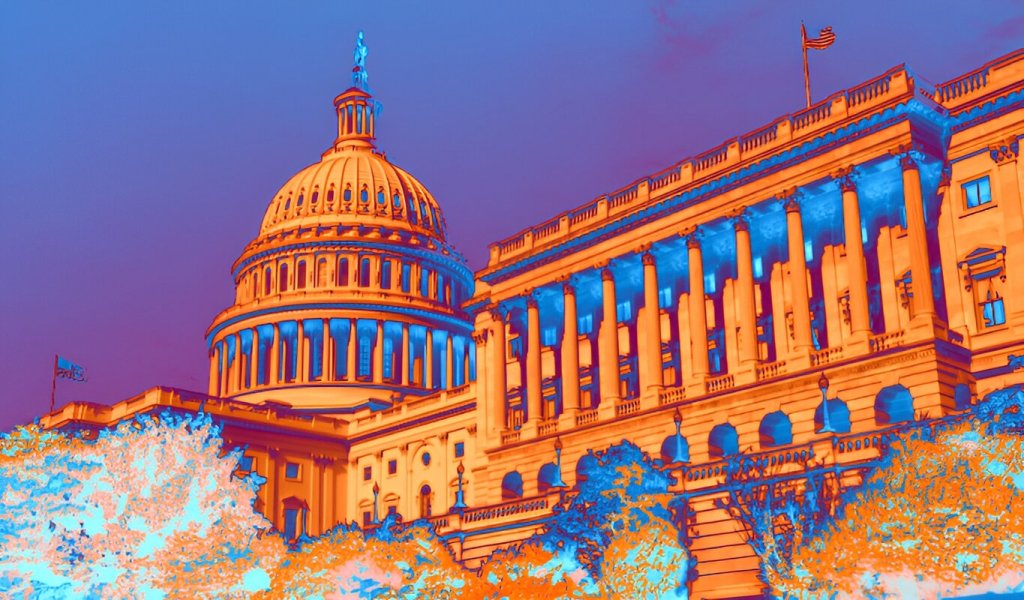 Congressional leaders are pressing regulators over concerns that the U.S. Securities and Exchange Commission (SEC)’s new guidelines on digital asset custody could disrupt financial innovation and regulatory collaboration. Lawmakers question whether the SEC acted prematurely, potentially jeopardizing efforts to safeguard digital assets through coordinated agency work. They demand more transparency on the SEC’s actions and […]
Congressional leaders are pressing regulators over concerns that the U.S. Securities and Exchange Commission (SEC)’s new guidelines on digital asset custody could disrupt financial innovation and regulatory collaboration. Lawmakers question whether the SEC acted prematurely, potentially jeopardizing efforts to safeguard digital assets through coordinated agency work. They demand more transparency on the SEC’s actions and […]

House of Representatives members brought up FTX, Donald Trump’s token launch, and SEC Chair Gary Gensler at the “Dazed and Confused” digital assets hearing.
A Republican lawmaker chairing a House subcommittee overseeing digital assets heavily criticized the United States Securities and Exchange Commission (SEC) and its chair, Gary Gensler, for “insert[ing] politics” into regulating crypto firms.
In a Sept. 18 hearing of the House Subcommittee on Digital Assets, Financial Technology and Inclusion, Arkansas Representative French Hill claimed that Chair Gensler’s approach to digital assets had led to “confusion and uncertainty” in the markets. At the Dazed and Confused: Breaking Down the SEC’s Politicized Approach to Digital Assets hearing, the subcommittee chair suggested alternative regulatory routes for crypto, such as the Financial Innovation and Technology for the 21st Century (FIT21) Act currently moving through Congress.
“[...] the pro-FIT21 and pro-regulatory framework views of the majority and many bipartisan does not mean we’re against the SEC going after bad actors or modernizing existing rules to incorporate digital asset securities and other unique instruments,” said Rep. Hill. “We’re against SEC enforcement abuse and making it hard for legitimate actors who are trying to follow the rules to do a fine job and bring innovation and technology to our markets.”

A group of blockchain advocates urged the United States Congress to clearly define NFTs in response to the SEC Wells notice to OpenSea.
In this week’s newsletter, read about how the non-fungible token (NFT) marketplace Magic Eden continues to dominate the space in trading volume, surpassing its competitors. However, the company has also faced backlash over its decision to segregate its United States-based services. Check out how a rare CryptoPunk sold for almost $1.5 million despite the market not looking good for NFTs. In other news, blockchain advocates urged the US Congress to define certain NFTs as consumer products and exempt them from securities laws.
Magic Eden clinched the top spot in trading volume in August, marking its sixth consecutive month in first place. The marketplace recorded a volume of $122.47 million, securing a 36.7% market share for the month.
Blue held the second spot with a trading volume of $84 million. This gave the NFT marketplace a market share of 25.4%. Meanwhile, OpenSea saw $66.5 million in trading volume in August, bringing its market share to almost 20%.

The CEO of OpenSea reported receiving a Wells notice from the SEC in August, suggesting that the commission could be taking a new regulatory approach to NFTs.
The crypto and blockchain advocacy organization Digital Chamber is calling on the United States Congress to enact legislation “to clearly define certain NFTs [non-fungible tokens] as consumer products and exempt them from federal securities laws” in response to potential enforcement actions against the OpenSea platform.
In a Sept. 10 notice, Digital Chamber described the US Securities and Exchange Commission (SEC) Wells notice against OpenSea as an “overreach into the digital asset industry.” Though the regulator had not filed a lawsuit against the NFT platform at the time of publication, a Wells notice suggested that the SEC was considering an enforcement action.
Source: Digital Chamber

The industry has amassed a historically large war chest, but little of it will be spent on the presidential clash between Trump and Harris.
Crypto entered the United States political arena in a big way in 2024.
Fairshake, the industry’s super political action committee (PAC), has already raised $119 million, primarily from corporate crypto donors.
Yet perhaps counterintuitively, little, if any, of this historically large sum will be spent on the presidential clash between Vice President Kamala Harris and former President Donald Trump.

Georgia Representative Mike Collins previously disclosed purchasing up to $65,000 in ETH, but seems to have moved onto altcoin investments.
Mike Collins, who has represented Georgia’s 10th Congressional District in the United States House of Representatives since 2023, disclosed three altcoin investments while in Congress.
In financial disclosure reports filed with the House of Representatives from July to August, Representative Collins revealed purchases of up to $15,000 in Velodrome (VELO), up to $15,000 in The Graph (GRT), and up to $115,000 in Aerodrome Finance (AERO). The same disclosures showed the US lawmaker partially sold his AERO holdings on Aug. 4 before making another purchase between $15,001 and $50,000 on Aug. 5.
Rep. Mike Collins’ financial disclosures. Source: Clerk, US House of Representatives.

It comes as decentralized prediction platform Polymarket has gathered more than $500 million in bets on who will likely win the 2024 United States presidential election.
Five United States Senators and three House representatives have renewed calls for the commodities regulator to ban betting on the 2024 presidential election.
They claimed that such markets “could influence and interfere with elections and further erode public trust in democracy” in an Aug. 5 letter to the Commodity Futures Trading Commission Chair, Rostin Benham.
“We urge you to promptly finalize and implement this rule to prevent the commodification of U.S. elections.”

Rep. Rich McCormick called on the US government to formally declare Tigran Gambaryan as a hostage if his criminal case in Nigeria was not resolved by mid-July.
Representative Rich McCormick introduced a resolution to the US Congress calling on lawmakers to consider a Binance executive who has been detained in Nigeria since February as a hostage.
In a July 10 resolution referred to the House Committee on Foreign Affairs, Rep. McCormick claimed the government of Nigeria had wrongfully detained Binance executive Tigran Gambaryan “in order to extort” the cryptocurrency exchange. He called on the US government to formally declare Gambaryan as a hostage and take steps to ensure the Nigerian government releases him and provides medical care if the case was not resolved by mid-July.
“Tigran’s detainment has been ongoing since February of 2024, the court typically takes a recess from mid-July to September,” said Rep. McCormick. “[I]f Tigran’s case is not resolved by mid-July, he may remain in detention for an even longer undue period of time.”

Though the resolution overturning an SEC rule on banks handling crypto passed in the House in May, the legislation required at least 288 members to override President Biden’s veto.
The US House of Representatives could not gather enough support to override President Joe Biden’s veto of a resolution affecting a Securities and Exchange Commission (SEC) rule on banks recording cryptocurrency as a liability on their balance sheets.
In a July 11 vote, 228 House members voted to override President Biden’s veto of H.J.Res. 109, overturning SEC Staff Accounting Bulletin (SAB) No. 121 — 60 votes short of the two-thirds majority required. The failed vote suggested that the veto would likely stand, and US banks would be limited from serving as crypto custodians for their customers, barring future legislation.
“It did not have to be this way,” said Representative Patrick McHenry on July 10 before a potential vote. “On digital assets, on the regulation of digital assets, on the functioning of a new asset class that a substantial number of Americans and the world are using [...] The Biden administration has been given every opportunity to work with this Congress on digital asset policy and to come to a reasonable resolution on digital asset policy.”

The US House of Representatives could be voting this week to overturn President Joe Biden’s veto of a bill that would have eliminated a controversial rule by the U.S. Securities and Exchange Commission (SEC). According to House Majority Leader Steve Scalise’s weekly schedule, the House of Representatives may vote this week to overturn Biden’s veto […]
The post US House May Vote This Week To Overturn President Biden’s Veto on Crypto-Related Bill SAB 121 appeared first on The Daily Hodl.